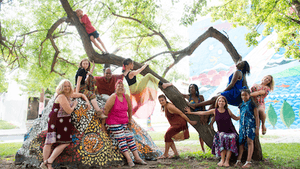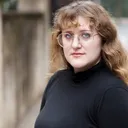Stay in the Loop
BSR publishes on a weekly schedule, with an email newsletter every Wednesday and Thursday morning. There’s no paywall, and subscribing is always free.
A bridge not far enough
The Bridge PHL Theatre Festival

I am a white, cisgender woman. I mention this because the Bridge PHL Theatre Festival is about bridging the gaps between white and black communities. The festival was generated by Philadelphia community members and artists, and performed in the Rotunda. Its producers, AngelPirate Productions and Naked Feet Theatrical Productions, also collaborated with Fresh Visions Youth Theatre to pull in voices from Philadelphia children (the performance I attended did not feature their pieces).
Collaborating on community-based social issues is an important task for all justice-oriented theater makers, so I’m happy to see people trying to do this work. However, while topically relevant, Bridge PHL never landed on a Philadelphia-specific topic, which made the producers’ intentions, and the setting of the performance (the Rotunda, and West Philly, with their long histories of community organizing) feel like wasted opportunities.
When "colorblind" is blinding
What was interesting about Bridge PHL were the parameters the theater artists established in their own pieces, and then, the complete disregard for those boundaries. For example, within the piece White Woman Meditates on White Privilege: An All Too True Story, writer and director Gabrielle Corsaro scrutinizes the word “colorblind.” She learns that being “colorblind” is a privilege only afforded to white people. It suggests we can somehow see past skin color to a person's “true" nature, as if skin color and subsequent life experience are somehow disconnected from personhood.
This is a value I believe the producers share. Yet I still walked away from the festival feeling as though much of the evening was “colorblind.” The first monologue, What Are You?, written by Danni Morinich and directed by Corsaro, described a light-skinned black woman whose life was influenced by her racial ambiguity. The actor, TS Hawkins (a last-minute replacement) had unambiguously dark skin. In a piece that is so racially specific, the dissonance between character and actor had the effect of colorblind casting. I had to overlook the color of the Hawkins’s skin in order to believe the piece. This was a shame, primarily because it was the piece I enjoyed the most, and because of Hawkins’s fine performance.
This clumsy handling of colorblindness continued beyond the first monologue. In the devised movement piece, Beloved Community (directed by Hannah Tsapatoris MacLeod), one of the black performers says he doesn’t think he’ll ever be able to foster love between himself and a white person without skepticism. There’s just too much difference. The white person in question responds, saying, “I’m glad we have our differences. It makes us who we are.” The performers then hug.
Celebrating difference vs. announcing privilege
This line shows that while the producers and directors of Bridge PHL might have an intellectual understanding of current social justice concepts, there is also an ineffective real-life implementation of these ideas. When a white person looks a black person in the face and says they are happy there are differences between them, it’s a statement of privilege. These are the same differences that could make a speeding ticket either fatal or simply annoying. Perhaps this line remained in Beloved Community to highlight the white instinct to pretend we can love each other out of this situation. But if so, the perspective we need to remind us this is both implausible and offensive was never provided.
There was a moment of genuine, theatrical conversation on race. In Beloved Community, three black performers sing “A Change Is Gonna Come,” while three white performers dance in the background. Ironically, this was the only time it felt as if the people of color took control of the evening. The white performers were finally just listening.
This came long after a line in White Woman Meditates that reminded us it is the white person’s responsibility to stop talking and start listening, and it encapsulates what was so frustrating about Bridge PHL. As a team of primarily white women, the producers and directors had all the instructions on facilitating a conversation about race, and yet they didn’t take their own advice. They remained colorblind, even when they knew otherwise. All of the directors of the performances I saw were white, even though there was plenty of language in the festival about stepping aside to provide opportunities for people of color.
The result of these conflicting messages was an evening of theater that was not only theatrically flat, but also thematically precious. Being precious is not good for the kind of growth we need, because it is protective and insulating. There’s no time to preciously philosophize about shedding our differences and loving each other. Repeating how much we must love each other does not create the conditions that make this love possible.
What, When, Where
The Bridge PHL Theatre Festival: Theatre for Healing Connections. Through Oct. 9, 2016 at the Rotunda, 4014 Walnut St., Philadelphia. [email protected].
Sign up for our newsletter
All of the week's new articles, all in one place. Sign up for the free weekly BSR newsletters, and don't miss a conversation.

 Tenara Calem
Tenara Calem